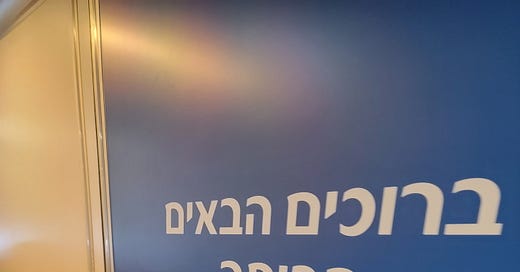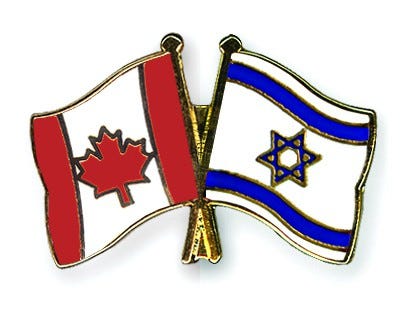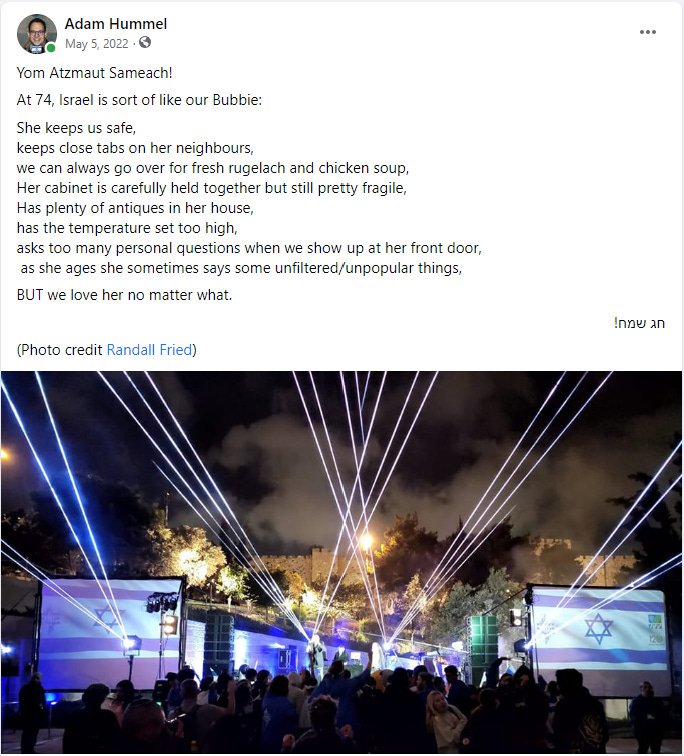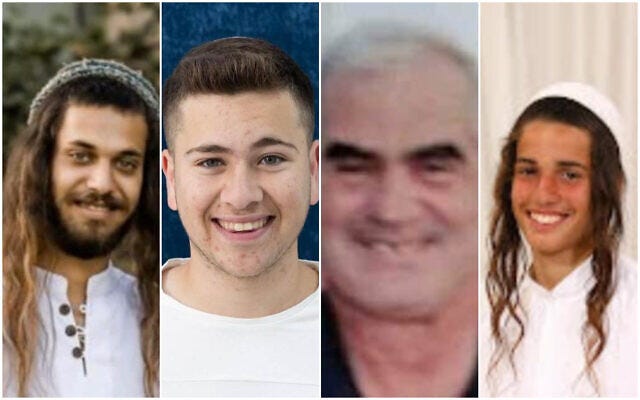Arrival
Landing in Israel is always exciting. You come in off the coast, cross into Israeli airspace, and prepare for landing. People often clap at first touch-down. The first time I arrived in Israel in 2000, we alit directly onto the tarmac and I knelt down and kissed the ground. These days however, you step off the plane into the jetway that takes you to the airport.
The first thing you see as you step off the plane is a sign that says in Hebrew, bruchim haba’im habayta, “welcome home.” As someone holding a foreign passport, this is always comforting to me. Stepping off the plane after 11 hours and being welcomed home forces me to immediately consider my relationship with this country, and reminds me that this is never a trip just like any other.
I imagine anyone who’s ever done a trip to Israel has been welcomed home, either by their tour guide, by a Member of Knesset, by a bus driver, or by the guy making your schwarma after he asks you where you come from and whether you want fries (chips) and amba on that.
Last week however, when I stepped off my flight at Ben Gurion Airport, being welcomed home made me think about the responsibility that welcoming someone home conveys. For the welcomer, you are giving the new arrival a lot of power. For the welcomee, well, let’s say you always act differently in someone else’s home than you do in your own.
Building bridges
For the first week of June, I was in Jerusalem for a conference with the World Jewish Congress (WJC). The goal was to create a “leadership bridge” between Diaspora and Israeli community leaders, to ensure we better understand each other at a time when there is a widening chasm between our worlds. Our goal was to engage in dialogue, open lines of communication, add each other to Whatsapp, and take tangible steps to address issues that can (but ought not) divide us.
During our meeting, President Herzog attended to launch the Voice of the People Initiative (Kol Ha’am Siach Yehudi Olami), intended to find points of commonality between the communities, and to be a platform to convene, plan, engage, and strategize.
“Engaging in dialogue with Israelis” sounds so outrageously formalistic so as to be silly. But for many Diaspora Jews, including us in Toronto, the conversation is not often open and honest. In Israel, our exposure to Israelis is on Birthright or a mission sponsored by an organization, where there is an agenda and limited exposure to “everyday Israelis.” Infrequently during such missions do you have a chance to spend time in a taxi chatting with the cab driver or in a bar hearing honesty flow freely from the lips of those who identify with different factions of the judicial overhaul movement.
Similarly in Canada, at least in my experience, you need to go looking for the voices of Israelis to have this conversation. Yes, there are plenty of Israelis who live and work in Canada, but they have already bridged the Israel-Diaspora gap: they live here, and they have a good sense of what the Jewish community in Canada is like. That’s certainly not the case for most Israelis in Israel.
I remember being heartbroken when on one of my first “uncontrolled” trips to Israel in 2004, I was at a bar chatting with some friends of my Israeli cousin. I was a university student then, involved with Hillel and Israel activism, and I was asking people there about life in Israel. The first person I spoke with said he didn’t care much for the notion of a Jewish State, and declared himself to be “post-Zionist.” I just couldn’t understand, and returned to my hostel that night slightly inebriated, assuming this was the unfortunate general attitude of young Israelis.
On that same trip, I had a meeting with Yael Dayan, Moshe’s daughter. I recall actually arguing with her after she told me that if she came across activists on campus protesting Israel and it’s policies towards the Palestinians, she would join them. I was horrified. Moshe Dayan’s daughter protesting “Israeli apartheid”? Surely she misunderstood the nature of the conflict overseas.
In my 20s, I was then left wondering: Was the mindset between us really that broad?
Today, in my 30s, I say not necessarily, but it is definitely complicated.
Should the Diaspora be involved in domestic Israeli affairs?
During the recent mission, we had countless opportunities to speak in both controlled and uncontrolled settings about the relationship between Israel and the Diaspora. The conversation was far too broad and nuanced to summarize in a single Substack post, but the question raised often was, in light of the ongoing protests in Israel: Should the Diaspora be involved in domestic Israeli affairs? The answer was always a resounding yes, but the way we arrived at that answer was different with each conversation.
Yes, the Diaspora should be involved because we do it from a place of love. We want Israel to be strong and to be the best version of itself, so when we “criticize” we do it as family, and not as a bystander. Debate is a critical part of a fruitful relationship.
Yes, the Diaspora should be involved because Israel is one of our largest investments. We spend a lot of time working PR for the Jewish State, and there is no reason why we should not have a voice for the idea that we defend the most in the world.
Yes, the Diaspora should be involved because we can make a difference. Fine, our children do not serve on the front lines of a military conflict, but we play a role on the international stage, and the relationship between the Diaspora and Israel is not a one-way street. It flows both ways, indeed more so now than in the past.
There are countless answers to this question, but the answer I kept coming back to was that Israelis, by welcoming Diaspora Jews home each time we arrive in Israel, are welcoming us to be involved. By telling us that your home is our home, and by telling us that we should be free to keep our shoes on, eat your food, use your towels, and swim in your pool, you are telling us that you value our opinion, if not only for the fact that we are family.
In that same vein, when we are told that Israel is home, then we take an ownership interest in the country too. There is a debate between having a vote or a voice, or being mere stakeholders as opposed to tachlis shareholders in the country, but in simple terms, of course we have a voice, and we should certainly use it. In the last 75 years, the Diaspora has overwhelmingly used its voice and position to prop up Israel, and show that it stands with the country and its foundational values, if not always with the government of the day. When we criticize, it comes from a place of wanting Israel to do better, with the best of intentions.
Bubbies
It truly bothers me when Diaspora Jews abandon Israel. To me, it is evidence of a fundamental misunderstanding of what Israel is and can be. It is one thing to criticize the country - we all do that - but it is another thing entirely to relentlessly attack and undermine Israel’s value.
In May 2021, I grew incredibly disheartened by the response in much of the Jewish world to Israel’s Operation Guardians of the Wall. At a time when there was an onslaught of antisemitism and anti-Zionism in the world, and while Israel was responding proportionately to a relentless barrage of rockets from Gaza, I was frankly appalled by how many Jews appeared ready to turn on Israel and throw in their lots with Israel’s haters. Unwilling to give Israel the benefit of the doubt, seemingly incapable of reading past the headline of a newspaper article, and bizarrely willing to make the equivalency between Israel and Hamas, I was so disappointed by how many Jews were willing to take the path of least resistance and throw Israel to the curb.
There ought to be no questioning Israel’s legitimacy, especially in our community. It is now 75 years old. It exists. It was brought into being by the United Nations unlike almost every other country on earth. It isn’t going anywhere. Deal with it. As Bari Weiss writes in How to Fight Anti-Semitism:
Imagine a young couple talking about having children. They have legitimate questions to discuss with each other: Can we afford it? Is our apartment big enough? Do we want to change our life so radically? Do we want to become parents? Once they have the baby, though, that conversation becomes immoral.
This is akin to the analogy that I’ve been playing around with a lot in recent years: Israel is like our Bubbie.
She’s now 75 years old. She’s getting older, and she’s starting to say some stuff that we may just never agree with. She almost seems like she’s from a different generation. She has our favourite food, loves when we come to visit, watches her neighbours, and her place is filled with antiques.
But, despite her aging, and despite some of what she sometimes says, we still love her. We do not discard her, do not stop visiting her, and do not distance ourselves from her. She means the world to us, and even if she does not take our advice or listen to us, we are still willing to go to her house, hold her hand, and make sure she feels comforted as the years ahead will no doubt grow more difficult.
Like our respective Bubbies, we do not throw Israel to the curb when we disagree with a statement or a policy decision. Israel is a sum of many parts, and it is a home where we ought to feel welcomed. Our brothers and sisters have also found a home there, and though we may sometimes have disagreements among our siblings or cousins, at the end of the day, we are family, and can hopefully get past the spat and recall what connects us.
The bridge between Israel and the Diaspora is built on a relationship. Like any relationship, in good times it is fun, and in difficult times it is challenging. But we do not run at the first sign of difficulty. We take solace in the fact that the relationship works both ways, and that we are stronger together. Zionism no longer seeks to eliminate the Diaspora, but can now only flourish with a vibrant Diaspora that bridges the gap, which sometimes begins with just the first step down the airport jetway.
In memory of Nachman Mordoff (17), Elisha Anteman (17), Harel Masood (21), and Ofer Fayerman (64), gunned down at the hands of brutal Palestinian terrorists, taken from us far too soon.










Amazing. So well written.